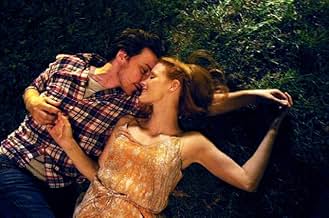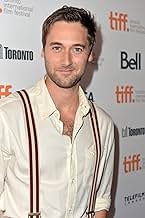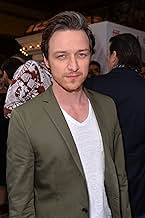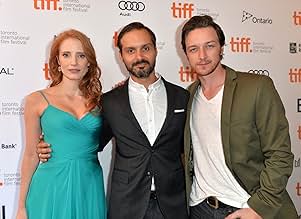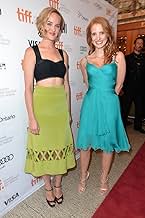La scomparsa di Eleanor Rigby - Lui
Titolo originale: The Disappearance of Eleanor Rigby: Him
VALUTAZIONE IMDb
6,8/10
10.618
LA TUA VALUTAZIONE
Raccontata dal punto di vista maschile, la storia di una coppia che cerca di riappropriarsi della vita e dell'amore che conoscevano una volta e di raccogliere i pezzi di un passato che potre... Leggi tuttoRaccontata dal punto di vista maschile, la storia di una coppia che cerca di riappropriarsi della vita e dell'amore che conoscevano una volta e di raccogliere i pezzi di un passato che potrebbe essere troppo lontano.Raccontata dal punto di vista maschile, la storia di una coppia che cerca di riappropriarsi della vita e dell'amore che conoscevano una volta e di raccogliere i pezzi di un passato che potrebbe essere troppo lontano.
- Regia
- Sceneggiatura
- Star
- Premi
- 1 vittoria e 3 candidature totali
Recensioni in evidenza
It's very odd how much The Disappearance of Eleanor Rigby: Her gets right that Him just can't measure up to. I'm not sure whether it's because I watched it second, but it's way more clumsily executed. While it does pay off a lot of things set up in Her (and I imagine it'll work vice versa) when it offers an alternate perspective on a scene, that's its only strength. Where Her approached sappiness with its insights on romance, Him too often breaches that mark. It's a more lightweight film, which comes with its own delights with Bill Hadar and that subplot, but moments which elicited tears in Her revisited here had little effect. I'm sure that's not a case of diminishing returns. McAvoy is reliably great, not quite as good as Chastain in Her, but again he bolsters the material. The problem with this portion of the pair is that it paints Eleanor Rigby in a very unappealing light, one I hadn't even considered with Her. Here, I don't see why he's chasing her so much. Nevertheless, Him is still a very good film for when it does hit the spot, just doesn't match its counterpart.
7/10
7/10
The Disppearance Of Eleanor Rigby (nothing to do with the Beatles song except a brief reference by a character) is a thoughtful, exceptionally well made film about a couple dealing with an immense tragedy that has put a weight on their relationship, forcing them to take some time apart. James Macavoy, an actor who continues to impress, and Jessica Chastain, always amazing, play the two with diligent feeling and palpable hurt. Now, there's three different edits of the film. His, which is mostly his side of events following the breakup, where Macavoy takes center stage and we see his life. Hers, which shows us where Chastain ends up, and how she is coping. The third version, Theirs, is a truncated version of both stories, leaving out a lot of key scenes and important beats. His and Hers together come out to about four hours of movie watching, but if you're going to invest yourself in their story, you owe it to you self to watch them both, starting with His. Because there is four hours of their story, they are allowed to develop and interact in a fashion that feels far more genuine and lifelike than a rushed two and a half hour movie. Macavoy is an aspiring cook who runs a small café with his friend and sous chef (Bill Hader, fiercely funny) and yearns for Chastain, angry at life for throwing them the curveball it did. He moves in with his father (Ciaran Hinds gives phenomenal work), a successful restauranteer. Chastain moves in with her folks as well, played by Isabelle Huppert and William Hurt. Hurt, who hasn't been around that much lately, makes up for that by anchoring a key scene with Chastain. It's interesting that he gets to play her father in a film, because they both share a measured, baleful, hypnotic grace in their work, and seeing them interacting was a treat for me, being an immense fan of both their work. Now, the film is more than the sum of its parts, but I mean that in a good way, since the parts themselves are so brilliantly done as well. It's what we expect from the romantic drama Avenue, but because we see an extended fluidity to the work, a narrative free from the fractured conventions of usual editing styles, we feel right there with our two protagonists, every step of the way. More films should break the mold and try to be more than just segmented movies, and use immersion techniques like this to draw us in. Coupled with that unique method of delivery comes a sincere commitment from actors and director alike, to explore an aspect of life and relationships that many see as unpleasant or upsetting, yet can still make for beautiful work. Well worth a watch.
The Disappearance of Eleanor Rigby
Him (2013)
This is part of a two segment movie about a couple recovering from tragedy (losing a young child) told from the point of view of the mother and father separately. Like "Her," this one is mostly about the protagonist, with some key elements from the relationship unravelling. And like "Her" there is very little about the grieving or the actual tragedy. We are supposed to be dropped into their lives long enough later to be in their individual recoveries.
The father here is James McAvoy, and he's good, but he doesn't have the intensity and range of Jessica Chastain, who carries the "Her" movie so well. The supporting cast is thinner here, too—Viola Davis makes only a tangential appearance, and there is little of Isabelle Hupert and none of William Hurt, who both make "Her" rather special. So here we have the somewhat clichéd "friends at a bar" as McAvoy's clan, and it's nothing much.
It's tough to judge all of this because I saw "Her" first and so the plot itself was new to me then, and here it is simply the retelling of the same story. So what was most interesting of all was the re-telling of the overlapping sections, seeing the events from different eyes. This wasn't pushed hard, which is fine (this is no "Rashoman"), and so it just makes the pair of movies gel.
Beware of the third movie, however—which has the suffix: "Them." I haven't see it (and won't), but it is apparently a mash of the first two, a shortened single version that apparently lacks the potentially probing aspects of the two halves seen singley or together. The two separate movies are sometimes shown or released as a marathon version that is not the same as the shortened, combined Them. So see one of the two single versions and go from there.
Advice: "Him" alone is not as satisfying as "Her," for commons reasons like the depth of acting as well as the range of characters. Chastain's version is better by far, but if you do see "Her" first, I think "Him" adds another layer that is satisfying, and not redundant except in just the right moments.
This is part of a two segment movie about a couple recovering from tragedy (losing a young child) told from the point of view of the mother and father separately. Like "Her," this one is mostly about the protagonist, with some key elements from the relationship unravelling. And like "Her" there is very little about the grieving or the actual tragedy. We are supposed to be dropped into their lives long enough later to be in their individual recoveries.
The father here is James McAvoy, and he's good, but he doesn't have the intensity and range of Jessica Chastain, who carries the "Her" movie so well. The supporting cast is thinner here, too—Viola Davis makes only a tangential appearance, and there is little of Isabelle Hupert and none of William Hurt, who both make "Her" rather special. So here we have the somewhat clichéd "friends at a bar" as McAvoy's clan, and it's nothing much.
It's tough to judge all of this because I saw "Her" first and so the plot itself was new to me then, and here it is simply the retelling of the same story. So what was most interesting of all was the re-telling of the overlapping sections, seeing the events from different eyes. This wasn't pushed hard, which is fine (this is no "Rashoman"), and so it just makes the pair of movies gel.
Beware of the third movie, however—which has the suffix: "Them." I haven't see it (and won't), but it is apparently a mash of the first two, a shortened single version that apparently lacks the potentially probing aspects of the two halves seen singley or together. The two separate movies are sometimes shown or released as a marathon version that is not the same as the shortened, combined Them. So see one of the two single versions and go from there.
Advice: "Him" alone is not as satisfying as "Her," for commons reasons like the depth of acting as well as the range of characters. Chastain's version is better by far, but if you do see "Her" first, I think "Him" adds another layer that is satisfying, and not redundant except in just the right moments.
When this intriguing and original film was first screened at the Toronto International Film Festival on September 9, it surprisingly didn't have a release date. Fortunately, The Globe and Mail reports that less than 24 hours after viewing its Toronto screening, distributor Harvey Weinstein scooped it up. And that's a very good thing — no one should have to miss out on this clever and creative story-telling.
Imagine, for a second, that a friend comes to tell you about his terrible break-up. You hear about how hurt he is and how devastatingly it ended, and you feel for him 100 per cent. But then a few days later, you happen to run into his ex and you hear her side of the story. Suddenly, the break-up doesn't seem so clear. Who's "at fault" is murky, and what really brought the relationship to a close is a complex and intricate issue. That's precisely the mystery that Ned Benson brings to us in his new film, The Disappearance of Eleanor Rigby: Him and Her. Rather than simply showing the complex issues of a marriage from one character's point of view, Benson created two separate but united films — one told from the point of view of the husband, and the second from that of the wife. Not only does Benson tackle the issue of perspective — but he also weaves in the subject of memory. What might initially seem like continuity errors between the two halves are quickly revealed to have far more significance and ultimately tell an equally affecting tale. Some differences are subtle, while some are striking — but all showcase how our perspectives subjective, but so too are our memories.
At the beginning of the movie, the lively and upbeat Conor (James McAvoy) and Eleanor (Jessica Chastain) are in a quickly disintegrating marriage. What follows are the stories of how each of them got to where they are, as individuals and as a couple, and where they hope to go. McAvoy and Chastain have proved themselves to be brilliant actors in their own rights — and, if you can believe it, they're even more dynamic and captivating together. Their deep understanding of the story paired with their commitment to the roles and intense chemistry makes this story enthralling to watch from beginning to end.
The one aspect that may have made it harder for this exceptional film to get a wide release is its length. Since it's essentially two separate films, it has a running time of three hours and ten minutes — and not everyone has the patience required. To combat this challenge, The Globe and Mail notes there has been some talk of showing the films each on their own rather than as a combined unit. Although the performances are spectacular, the writing compelling, and the direction well done in each film, it seems to me that a lot of the brilliance of the film's structure would be lost without the two parts together. It's the clever balancing act between the two perspectives and the way they address how much we can trust our memories that make The Disappearance of Eleanor Rigby: Him and Her so unique and captivating. If you were to take away the "Him and Her" in favour of one pronoun or the other, I feel you would lose a great deal of what makes the film special. It might be a longer haul as far as romantic dramas go, but I beg you to grab your popcorn — and a sizeable coffee if necessary — and settle in for the full three hours. This powerful and invigorating tale is worth the time.
Imagine, for a second, that a friend comes to tell you about his terrible break-up. You hear about how hurt he is and how devastatingly it ended, and you feel for him 100 per cent. But then a few days later, you happen to run into his ex and you hear her side of the story. Suddenly, the break-up doesn't seem so clear. Who's "at fault" is murky, and what really brought the relationship to a close is a complex and intricate issue. That's precisely the mystery that Ned Benson brings to us in his new film, The Disappearance of Eleanor Rigby: Him and Her. Rather than simply showing the complex issues of a marriage from one character's point of view, Benson created two separate but united films — one told from the point of view of the husband, and the second from that of the wife. Not only does Benson tackle the issue of perspective — but he also weaves in the subject of memory. What might initially seem like continuity errors between the two halves are quickly revealed to have far more significance and ultimately tell an equally affecting tale. Some differences are subtle, while some are striking — but all showcase how our perspectives subjective, but so too are our memories.
At the beginning of the movie, the lively and upbeat Conor (James McAvoy) and Eleanor (Jessica Chastain) are in a quickly disintegrating marriage. What follows are the stories of how each of them got to where they are, as individuals and as a couple, and where they hope to go. McAvoy and Chastain have proved themselves to be brilliant actors in their own rights — and, if you can believe it, they're even more dynamic and captivating together. Their deep understanding of the story paired with their commitment to the roles and intense chemistry makes this story enthralling to watch from beginning to end.
The one aspect that may have made it harder for this exceptional film to get a wide release is its length. Since it's essentially two separate films, it has a running time of three hours and ten minutes — and not everyone has the patience required. To combat this challenge, The Globe and Mail notes there has been some talk of showing the films each on their own rather than as a combined unit. Although the performances are spectacular, the writing compelling, and the direction well done in each film, it seems to me that a lot of the brilliance of the film's structure would be lost without the two parts together. It's the clever balancing act between the two perspectives and the way they address how much we can trust our memories that make The Disappearance of Eleanor Rigby: Him and Her so unique and captivating. If you were to take away the "Him and Her" in favour of one pronoun or the other, I feel you would lose a great deal of what makes the film special. It might be a longer haul as far as romantic dramas go, but I beg you to grab your popcorn — and a sizeable coffee if necessary — and settle in for the full three hours. This powerful and invigorating tale is worth the time.
Hollywood has given us some of the greatest love stories ever told, but they don't always seem real. The Disappearance of Eleanor Rigby: Him is just about as real of a story as you will get. Not only does it delve into problems that couples regularly have, but it gives us a sense of what it's like to try and overcome a tragedy close to home. It's not a film I recommend you watch as a "chick flick" or when you're in any sort of good mood. But if you are looking to be a little sad and perhaps wanting to see what it may be like to be in a difficult marriage this is the film for you.
The way these two films are told is extremely risky and experimental. I have not seen "Them" but I imagine the films were meant to be separate and not combined into one. "Him" gives us James McAvoy's perspective on the couples attempt to rekindle their relationship. I liked this side a lot more. I guess it could be because I was able to relate more to a man's view on a relationship rather than a woman's? Or maybe it was because this side just flows a little bit nicer. I definitely think this is the film you should watch first. McAvoy's character, Conor Ludlow, acts like any guy would act when his wife or significant other suddenly removes herself from his life. You just want answers, but relationships are never that simple. The film really seems to take the (500) Days of Summer approach of not promising anything clichéd or Hollywood like happening, rather giving their relationship a grounded realistic take.
There are quite a few moments of true romance. Lines like "Before you I didn't know who I was" come off as just heartbreaking knowing that this is the same for so many other couples. Love is something that doesn't come easily or without work. But I think if you truly love someone, in the end the effort and sacrifice is all worth it. It's a form of a love story sure, but it became more of a character story of overcoming tragedy and accepting that life does go on after. I would imagine it's something that seems unimaginable, but at the same time unavoidable. I really liked the way the film ended, especially with the music. Although I'm curious to see how they could have ended "Them" knowing they have to accommodate both sides.
+McAvoy's real performance
+Score & soundtrack
+Relatable real life relationship
-Can be too depressing at times
8.3/10
The way these two films are told is extremely risky and experimental. I have not seen "Them" but I imagine the films were meant to be separate and not combined into one. "Him" gives us James McAvoy's perspective on the couples attempt to rekindle their relationship. I liked this side a lot more. I guess it could be because I was able to relate more to a man's view on a relationship rather than a woman's? Or maybe it was because this side just flows a little bit nicer. I definitely think this is the film you should watch first. McAvoy's character, Conor Ludlow, acts like any guy would act when his wife or significant other suddenly removes herself from his life. You just want answers, but relationships are never that simple. The film really seems to take the (500) Days of Summer approach of not promising anything clichéd or Hollywood like happening, rather giving their relationship a grounded realistic take.
There are quite a few moments of true romance. Lines like "Before you I didn't know who I was" come off as just heartbreaking knowing that this is the same for so many other couples. Love is something that doesn't come easily or without work. But I think if you truly love someone, in the end the effort and sacrifice is all worth it. It's a form of a love story sure, but it became more of a character story of overcoming tragedy and accepting that life does go on after. I would imagine it's something that seems unimaginable, but at the same time unavoidable. I really liked the way the film ended, especially with the music. Although I'm curious to see how they could have ended "Them" knowing they have to accommodate both sides.
+McAvoy's real performance
+Score & soundtrack
+Relatable real life relationship
-Can be too depressing at times
8.3/10
Lo sapevi?
- QuizJessica Chastain dropped out of Iron Man 3 (2013) to work on this film.
- Versioni alternativeThis film, along with "The Disappearance of Eleanor Rigby: Her" (2013) and "The Disappearance of Eleanor Rigby--Them" (2014) are variations of the same film. Runtimes are different, as well as editing, which puts the emphasis on the protagonists' different points of view.
- ConnessioniEdited into La scomparsa di Eleanor Rigby - Loro (2014)
- Colonne sonoreThe Lucky One
Written by Tomas Costanza, Jacquelyn Willard, Ashley Levy, 'Nikki Thompson' and Mike London
Performed by Jacquelyn Willard
Courtesy of Killingsworth Recording Company
I più visti
Accedi per valutare e creare un elenco di titoli salvati per ottenere consigli personalizzati
- How long is The Disappearance of Eleanor Rigby: Him?Powered by Alexa
Dettagli
- Data di uscita
- Paese di origine
- Sito ufficiale
- Lingua
- Celebre anche come
- The Disappearance of Eleanor Rigby: Him
- Luoghi delle riprese
- Aziende produttrici
- Vedi altri crediti dell’azienda su IMDbPro
Botteghino
- Lordo in tutto il mondo
- 109.144 USD
- Tempo di esecuzione
- 1h 29min(89 min)
- Colore
- Mix di suoni
- Proporzioni
- 2.35 : 1
Contribuisci a questa pagina
Suggerisci una modifica o aggiungi i contenuti mancanti



